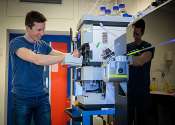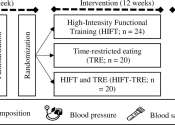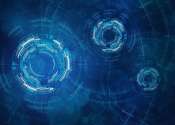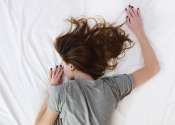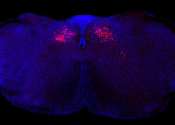Last update:
Neuroscience
Targeting hippocampal neurons to unlock existing Alzheimer's drugs
A team of researchers at Kobe Gakuin University in Japan have genetically engineered insulin-fused proteins capable of targeting hippocampal neurons. The innovative technique capitalizes on insulin's natural tendency to accumulate ...
8 hours ago
0
38
Diseases, Conditions, Syndromes
Inside RSV: Researchers pinpoint markers of more severe cases
Respiratory syncytial virus (RSV) remains the top cause of hospitalization among young children, leading to respiratory issues like bronchiolitis and pneumonia. However, the reasons why some children experience only mild ...
11 hours ago
0
29
Medical research news
Study finds 'brain endurance training' boosts cognitive and physical abilities in older adults
Brain endurance training (BET), a combined cognitive and exercise training method developed for athletes, boosts cognitive and physical abilities in older adults.
Oct 11, 2024
0
36

Study identifies genetic factors crucial in acute myeloid leukemia survival for Black patients
Researchers have led a global study that identified molecular predictors of survival among Black patients with acute myeloid leukemia (AML). The study suggests a need to modify current AML risk layers by including ancestry-specific ...
Oct 11, 2024
0
44

Framework reveals how neglecting income, education and ethnicity affects disease spread predictions on COVID-19 data
An international team of researchers have developed an innovative approach to epidemic modeling that could transform how scientists and policymakers predict the spread of infectious diseases. Led by Dr. Nicola Perra, Reader ...
Oct 11, 2024
0
31

Possible trigger of Crohn's disease discovered: Dysfunctional mitochondria disrupt the gut microbiome
Disruptions of mitochondrial functions have a fundamental influence on Crohn's disease. This connection has now been demonstrated by researchers at the Technical University of Munich (TUM). In a study published in Cell Host ...
Oct 11, 2024
0
52

Dual immunotherapy plus chemotherapy found to benefit specific subset of patients with lung cancer
Researchers from The University of Texas MD Anderson Cancer Center have demonstrated that patients with metastatic non-squamous non-small cell lung cancer (NSCLC) harboring specific mutations in the STK11 and/or KEAP1 tumor ...
Oct 11, 2024
0
58

An AI-powered pipeline for personalized cancer vaccines
Ludwig Cancer Research scientists have developed a full, start-to-finish computational pipeline that integrates multiple molecular and genetic analyses of tumors and the specific molecular targets of T cells and harnesses ...
Oct 11, 2024
0
5

A potential non-invasive stool test and novel therapy for endometriosis
Promising findings by researchers at Baylor College of Medicine and collaborating institutions could lead to the development of a non-invasive stool test and a new therapy for endometriosis, a painful condition that affects ...
Oct 11, 2024
0
23

Study shows key brain protein can impact behavior in mice
Researchers at the University of Kentucky were part of a team that discovered a key protein in the brain that can regulate motivation for reward in mice.
Oct 11, 2024
0
18

Cancer drug could be used to save the limbs of peripheral artery disease patients, pre-clinical study suggests
Researchers at the Heart Research Institute (HRI) have made a new discovery, finding an existing drug used to kill tumor cells in cancer patients could also be used to save the limbs of patients with blocked arteries in their ...
Oct 11, 2024
0
45

New study identifies genetic changes in brain development that may contribute to schizophrenia
A collaborative study between researchers at the Icahn School of Medicine at Mount Sinai and Harvard Medical School has identified genetic mutations that occur during brain development and may contribute to the development ...
Oct 11, 2024
0
46

Typhoid vaccine trial confirms sustained protection for older children
A single dose of typhoid conjugate vaccine (TCV) offers safe, effective protection against typhoid two years after vaccination in all children, and sustained protection for older children at three to five years post immunization, ...
Oct 11, 2024
0
7

Brain cell connectivity research provides a potential target for anxiety disorders
Scientists at Université de Montréal and its affiliated Montreal Clinical Research Institute (IRCM) have uncovered unique roles for a protein complex in the structural organization and function of brain cell connectivity, ...
Oct 11, 2024
1
49

Researchers find cord blood cells can build a better human immune system into mice
Immunity plays a central role in the fight against cancer. Many of the current immunotherapies aim at helping the patient's immune system to better recognize cancer cells—by using engineered antibodies—or by simply providing ...
Oct 11, 2024
0
32

Protein blocking bone development could hold clues for future osteoporosis treatment
Scientists have identified a protein that blocks the activity of bone-forming cells (osteoblasts) by stopping them from maturing during the journey to sites of bone formation.
Oct 11, 2024
0
62

Evidence builds for near infrared light treatment in traumatic brain injury
Birmingham scientists have shown light therapy delivered transcranially (through the skull) can aid tissue repair after mild traumatic brain injury (mTBI).
Oct 11, 2024
0
35

Inflammatory bowel diseases may be detectable at birth
Across the Western world, the prevalence of inflammatory bowel diseases, which have no cure, is rising. In Denmark alone, 50,000 people suffer from either Crohn's disease or ulcerative colitis, which represents a doubling ...
Oct 11, 2024
0
1

Study finds defective sperm doubles the risk of preeclampsia
For the first time, researchers have linked specific frequent defects in sperm to risk of pregnancy complications and negative impacts on the health of the baby. The study from Lund University in Sweden shows that high proportion ...
Oct 11, 2024
0
29

Researchers suggest motor delay and low muscle tone may indicate genetic disorders
In a new study, UCLA Health researchers have found that motor delay and low muscle tone were common signs of an underlying genetic diagnosis in children with neurodevelopment disorders.
Oct 11, 2024
0
54

























